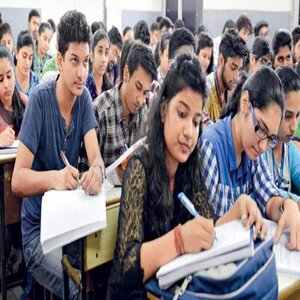NITI Aayog Extends Support for New AICTE Engineering Norms, Suggests to Drop Maths and Physics
 The NITI Aayog has mooted that, candidates who have studied any three of the 14 subjects in Class 12 as proposed by the AICTE (All India Council for Technical Education) in its new norms for engineering may be “allowed to compete” in the all-India entrance examination.
The NITI Aayog has mooted that, candidates who have studied any three of the 14 subjects in Class 12 as proposed by the AICTE (All India Council for Technical Education) in its new norms for engineering may be “allowed to compete” in the all-India entrance examination.
This was suggested at a June 11 meeting called to discuss the new norms, which do away with the mandatory requirement of physics and math for undergraduate engineering programmes. As reported by The Indian Express, NITI Aayog member and scientist V K Saraswat expressed serious reservations about the change in the entry qualification criteria at the meeting.
However, as per sources, the other key participants seemed to be veering around to the AICTE’s proposals. The idea of an all-India entrance examination with an expanded list of subjects on offer was suggested by NITI Aayog Vice-Chairman Rajiv Kumar, who chaired the meeting. Apart from him and Saraswat, AICTE chairman Anil Sahasrabudhe, Higher Education Secretary Amit Khare and NITI Aayog members Dr V K Paul and Dr Ramesh Chand were the key participants.
Sources said three action points emerged at the meeting. “The vice-chairman suggested that to ensure quality as well as equal opportunity, a national-level entry examination in line with NEET may be worked out for engineering education; that candidates with any of the subjects proposed by the AICTE may be allowed to compete; and that institutions and universities be barred from accepting admissions without the entrance exam.”
Kumar is believed to have also suggested that the committee tasked by the AICTE to list the branches for which studying physics and mathematics in plus-two will not be a prerequisite could look at the possibilities of the revamped engineering entrance examination. “Kumar advised the AICTE to work in collaboration with the NITI Aayog in this regard,” the source said.
The consensus was that the AICTE should prepare the model curriculum for such an examination. The IITs have a separate entrance system and will not be covered by the new AICTE proposals.
During the meeting, Sahasrabudhe made a presentation on the existing status and future plans regarding entry-level qualification norms for engineering education, as laid down in the Approval Process Handbook (APH) 2021-22.
According to the norms proposed in the APH 2021-22, any student who has obtained 45% marks in Class 12 in any of the three subjects from a list of 14 — Physics, Mathematics, Chemistry, Computer Science, Electronics, Information Technology, Biology, Informatics Practices, Biotechnology, Technical Vocational Subject, Agriculture, Engineering Graphics, Business Studies and Entrepreneurship — is eligible for undergraduate engineering programmes. The cut-off is 40% in case of candidates belonging to reserved categories.
“The Universities will offer suitable bridge courses such as Mathematics, Physics, Engineering drawing, etc, for the students coming from diverse backgrounds to achieve desired learning outcomes of the programme,” the new norms say.
It is learnt that during the meeting, Sahasrabudhe also argued that no compulsion be placed on any university or institution to make any of the 14 subjects mandatory for admission.
Sahasrabudhe described the new eligibility criteria as being in sync with the “multidisciplinary approach” of the National Education Policy-2020 and said it was “optional” in nature.
Higher Education Secretary Khare is learnt to have suggested a “graded approach” instead of complete overhaul of the eligibility norms. “He suggested that a few select institutions/courses may be allowed to implement a pilot based on the revised norms,” said a source.
Dr V K Paul and Dr Ramesh Chand also supported the new eligibility norms.
Opposing them, Saraswat stressed that physics and mathematics be retained as mandatory subjects for engineering entrance. “He highlighted that 60 % of current engineering graduates are not employable (as per studies). He also pointed to the lack of a consistent standard for engineering entrance examinations across the country.”
Sahasrabudhe had earlier told The Indian Express that the matter was still under discussion. “All of us will sit together and hold more discussions.” Saraswat had said he did not wish to speak on the matter.
Other experts have also cautioned against the AICTE making physics and mathematics optional for engineering aspirants in plus-two, including Principal Scientific Advisor K VijayRaghavan. He earlier told The Indian Express that “rigour and depth in mathematics and physics comes easier early on” and that it would be wiser to study these subjects in plus-two before seeking admission to B. E and B.Tech programmes.

